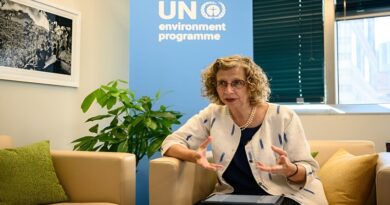In one year, Israel halves plastic bags found in the sea
One year after the State of Israel introduced a law that required supermarkets to charge customers for the use of plastic bags, use of the bags has dropped by 80 per cent, and bag waste found in the sea has halved, according to government sources.
Big supermarkets must charge their customers at least 0.10 Israeli new shekels (about $US 0.03) for each bag, and must show the cost of the bags on the customer’s bill. Additionally, supermarkets must report the number of bags distributed to the Government, and proceeds of the sale go to the government to fund projects to cut air pollution throughout the country.
The law comes in part as a result of the work of UN Environment’s SwitchMed programme, which has worked with the country to set up a National Action Plan on sustainable consumption and production.
A two-day policy workshop run by UN Environment’s EU-funded SwitchMed project entitled “Policy Tools for Circular Economy” held in Jerusalem in 2014 highlighted facilitated the formulation of the legislation by highlighting the lessons learnt from similar laws internationally.
Israel’s Minister of Environmental Protection, MK Zeev Elkin, highlighted how successful the law has been by international standards.
“We see 80 per cent reduction in plastic bags consumption in less than a year,” he said. “This is a success even in worldwide standards. For comparison, an 80 per cent reduction rate in the use of disposable bags at large retailers is the European Union’s target for 2020, for which five years of deployment have been given. I am proud of the Israeli public that understands the importance of reducing plastic bags waste and changed its behaviour so rapidly.”
Money raised from the sale of the bags goes to the Ministry of Environmental Protection’s Maintenance of Cleanliness Fund. According to the Ministry’s website, the money is used to fund air pollution reduction projects, to raise awareness about the new law, and to support manufacturers so that they can adjust their operations to comply with the legislation.
Dr Ohad Carny, the Israeli SwitchMed Focal Point said establishing a National Action Plan on sustainable consumption and production had been important. “The workshops and learning process that was part of the preparation of the Action Plan had crucial significance in designing policy measures toward sustainable consumption and production, such as the plastic bags law,” he said. “We are still in the implementation phase of the action plan and I believe we will see more progress down this path in the future.”
Some key facts and figures (as of January 2017):Total annual consumption of plastic bags from supermarkets in Israel is 2.7 billion. Israelis use on average 325 bags each per year, while the average household uses 1,200 bags.
One quarter of all bags are thrown away immediately after use and the total weight of supermarket plastic bags in waste is 15,000 tons. Supermarket chains pay about NIS 80 million a year for plastic bags.




